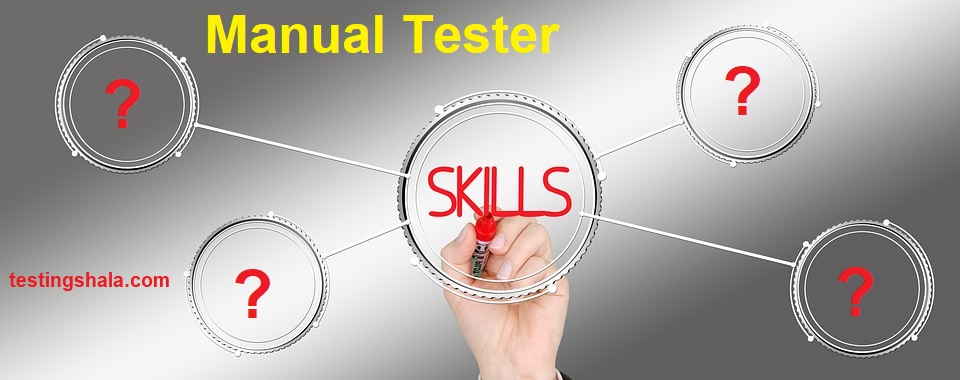Manual testing or manual testers requires a combination of both technical skills and soft skills to perform his or her duties effectively. Below are the some of the important skills that must or should have for any software testers in order to succeed in the field of software testing

1)Strong understanding of testing principles and methodologies
A manual tester should have a good understanding of testing principles and methodologies, such as functional, regression, integration, and exploratory testing.
For example, a manual tester should know how to write test cases, execute them, and report bugs using a defect tracking tool. They should also know how to create test plans, test scenarios, and test strategies based on project requirements.
2)Test Case Design and Execution
Manual testers should be able to design and execute test cases effectively. They should have a good understanding of how to create test cases that are specific, measurable, achievable, relevant, and time-bound (SMART).
For example, a manual tester should be able to design test cases that cover all possible scenarios and edge cases. They should also be able to execute these test cases and report defects.
3)Test Data Management
Manual testers should be able to create and manage test data for their tests. They should have a good understanding of the test data requirements and be able to create test data that accurately reflects real-world scenarios.
For example, a manual tester should be able to create test data that represents different user profiles, user roles, and user data.
4)Test Environment Management
Manual testers should be able to manage the test environment effectively. They should have a good understanding of the requirements for the test environment and be able to set up and maintain it.
For example, a manual tester should be able to set up a test environment that includes the required hardware and software components.
5)Defect Management
Manual testers should be able to manage defects effectively. They should have a good understanding of the defect life cycle and be able to track and report defects.
For example, a manual tester should be able to report defects accurately, including details such as steps to reproduce, expected and actual results, and severity.
6)Test Automation Tools
Manual testers should have a basic understanding of test automation tools and frameworks.
For example, they should be able to use automation tools to generate test data, run regression tests, and perform functional testing. They should also be able to analyze test automation results and report issues.
7)Debugging Tools
Manual testers should be able to use debugging tools to analyze and troubleshoot issues.
For example, they should be able to use browser development tools to debug issues with web applications, or use log files to troubleshoot issues with backend systems.
8)SQL and Database Skills
Manual testers should have basic knowledge of SQL and databases to perform data validation and to verify data integrity.
For example, a manual tester should be able to write SQL queries to extract data from a database and perform data validation.
9)Basic Programming Skills
Manual testers should have basic programming skills to create test automation scripts, write test data generators, and perform basic debugging tasks.
For example, a manual tester should be able to write simple scripts using programming languages such as Python, Java or JavaScript.
10)Attention to detail
Manual testers need to be detail-oriented and have a keen eye for spotting defects, errors, and inconsistencies.
For example, a manual tester should be able to identify small visual issues such as alignment, spacing, font size, and color discrepancies. They should also be able to spot logical errors, functional gaps, and usability issues that may impact the end-user experience.
11)Strong analytical skills
Manual testers should be able to analyze test results, identify defects, and troubleshoot issues.
For example, a manual tester should be able to analyze test data to identify patterns, trends, and outliers. They should also be able to use debugging tools to investigate and isolate issues, and work with developers to find root causes and solutions.
12)Communication skills
Manual testers should have strong communication skills, both written and verbal, to communicate test results, issues, and risks to stakeholders.
For example, a manual tester should be able to write clear and concise bug reports that include steps to reproduce, expected results, and actual results. They should also be able to conduct effective meetings, presentations, and status updates to keep stakeholders informed of testing progress.
13)Collaboration and teamwork
Manual testers often work as part of a larger development team, so they need to be able to collaborate and work effectively with others.
For example, a manual tester should be able to work closely with developers, business analysts, project managers, and other testers to ensure that testing is aligned with project goals and objectives. They should also be able to share knowledge and best practices with other team members.
14)Time management and organization
Manual testers need to be able to manage their time and organize their work effectively to meet project deadlines.
For example, a manual tester should be able to prioritize testing tasks based on criticality and risk, estimate testing effort accurately, and report progress regularly. They should also be able to multitask and switch context quickly to handle multiple tasks and projects simultaneously.
